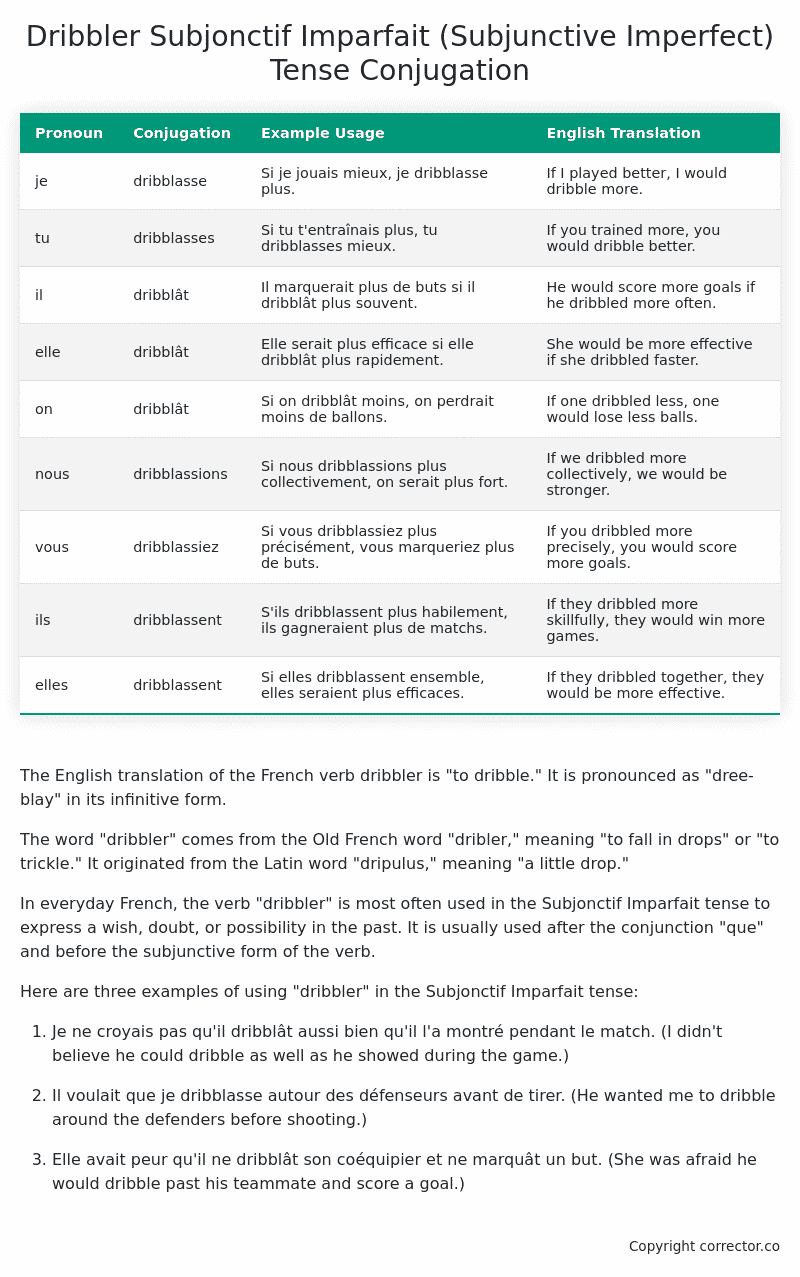Subjonctif Imparfait (Subjunctive Imperfect) Tense Conjugation of the French Verb dribbler
Introduction to the verb dribbler
The English translation of the French verb dribbler is “to dribble.” It is pronounced as “dree-blay” in its infinitive form.
The word “dribbler” comes from the Old French word “dribler,” meaning “to fall in drops” or “to trickle.” It originated from the Latin word “dripulus,” meaning “a little drop.”
In everyday French, the verb “dribbler” is most often used in the Subjonctif Imparfait tense to express a wish, doubt, or possibility in the past. It is usually used after the conjunction “que” and before the subjunctive form of the verb.
Here are three examples of using “dribbler” in the Subjonctif Imparfait tense:
-
Je ne croyais pas qu’il dribblât aussi bien qu’il l’a montré pendant le match. (I didn’t believe he could dribble as well as he showed during the game.)
-
Il voulait que je dribblasse autour des défenseurs avant de tirer. (He wanted me to dribble around the defenders before shooting.)
-
Elle avait peur qu’il ne dribblât son coéquipier et ne marquât un but. (She was afraid he would dribble past his teammate and score a goal.)
Table of the Subjonctif Imparfait (Subjunctive Imperfect) Tense Conjugation of dribbler
| Pronoun | Conjugation | Example Usage | English Translation |
|---|---|---|---|
| je | dribblasse | Si je jouais mieux, je dribblasse plus. | If I played better, I would dribble more. |
| tu | dribblasses | Si tu t’entraînais plus, tu dribblasses mieux. | If you trained more, you would dribble better. |
| il | dribblât | Il marquerait plus de buts si il dribblât plus souvent. | He would score more goals if he dribbled more often. |
| elle | dribblât | Elle serait plus efficace si elle dribblât plus rapidement. | She would be more effective if she dribbled faster. |
| on | dribblât | Si on dribblât moins, on perdrait moins de ballons. | If one dribbled less, one would lose less balls. |
| nous | dribblassions | Si nous dribblassions plus collectivement, on serait plus fort. | If we dribbled more collectively, we would be stronger. |
| vous | dribblassiez | Si vous dribblassiez plus précisément, vous marqueriez plus de buts. | If you dribbled more precisely, you would score more goals. |
| ils | dribblassent | S’ils dribblassent plus habilement, ils gagneraient plus de matchs. | If they dribbled more skillfully, they would win more games. |
| elles | dribblassent | Si elles dribblassent ensemble, elles seraient plus efficaces. | If they dribbled together, they would be more effective. |
Other Conjugations for Dribbler.
Le Present (Present Tense) Conjugation of the French Verb dribbler
Imparfait (Imperfect) Tense Conjugation of the French Verb dribbler
Passé Simple (Simple Past) Tense Conjugation of the French Verb dribbler
Passé Composé (Present Perfect) Tense Conjugation of the French Verb dribbler
Futur Simple (Simple Future) Tense Conjugation of the French Verb dribbler
Futur Proche (Near Future) Tense Conjugation of the French Verb dribbler
Plus-que-parfait (Pluperfect) Tense Conjugation of the French Verb dribbler
Passé Antérieur (Past Anterior) Tense Conjugation of the French Verb dribbler
Futur Antérieur (Future Anterior) Tense Conjugation of the French Verb dribbler
Subjonctif Présent (Subjunctive Present) Tense Conjugation of the French Verb dribbler
Subjonctif Passé (Subjunctive Past) Tense Conjugation of the French Verb dribbler
Subjonctif Imparfait (Subjunctive Imperfect) Tense Conjugation of the French Verb dribbler (this article)
Subjonctif Plus-que-parfait (Subjunctive Pluperfect) Tense Conjugation of the French Verb dribbler
Conditionnel Présent (Conditional Present) Tense Conjugation of the French Verb dribbler
Conditionnel Passé (Conditional Past) Tense Conjugation of the French Verb dribbler
L’impératif Présent (Imperative Present) Tense Conjugation of the French Verb dribbler
L’infinitif Présent (Infinitive Present) Tense Conjugation of the French Verb dribbler
Struggling with French verbs or the language in general? Why not use our free French Grammar Checker – no registration required!
Get a FREE Download Study Sheet of this Conjugation 🔥
Simply right click the image below, click “save image” and get your free reference for the dribbler Subjonctif Imparfait tense conjugation!

Dribbler – About the French Subjonctif Imparfait (Subjunctive Imperfect) Tense
Formation
Common Everyday Usage Patterns
Interactions with Other Tenses
Subjonctif Présent
Indicatif Passé Composé
Conditional
Conditional Perfect
Summary
I hope you enjoyed this article on the verb dribbler. Still in a learning mood? Check out another TOTALLY random French verb conjugation!


